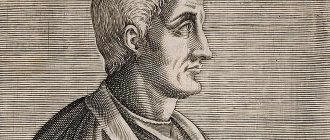Russian playwright, diplomat and composer - all about Alexander Sergeevich Griboedov, who lived a short but very colorful life. The brilliant comedy “Woe from Wit” brought him popularity and immortality.
Alexander Sergeevich Griboyedov was born on January 15 (4 according to the old style) January 1795 (according to other sources - 1790) in Moscow into a noble family. The future Russian diplomat was very gifted - now they are called child prodigies. At the age of six, he spoke three foreign languages fluently, and when he went to school, he could already speak six, and even understood ancient Greek and Latin perfectly. He spoke French, English, German, Italian, Greek, Latin, and later mastered Arabic, Persian, and Turkish.
Childhood and education
At the age of eight, the boy was sent to a boarding school at Moscow University, from which he graduated three years later. At the age of thirteen, Griboedov became a candidate of literary sciences. At the same time, he was fascinated by exact science, so the young man decided to get an education at the physics and mathematics department. At this point, the student has already received a PhD in Law. Professor Johann Theophilus Bule himself monitored the student’s incredible successes . None of his peers could boast of the number of awards that Griboyedov received during his years of study in Moscow.
Griboyedov Alexander Sergeevich
- Despite reason, despite the elements.
- The legend is fresh, but hard to believe.
- I would be glad to serve, but being served is sickening.
- A mixture of languages - French and Nizhny Novgorod.
- Happy hours are not observed.
- I walked into the room and ended up in another.
- More in number, cheaper in price.
- To have children, who lacked intelligence!
However, he will reach the known levels, Because nowadays they love the dumb. * * * And all the Kuznetsky Bridge, and the eternal French, From there to us, both authors and muses: Destroyers of pockets and hearts! * * * Who are the judges? - Over the course of ancient times, their enmity towards a free life is irreconcilable, * * * Eh? What do you think? In our opinion, he is smart. He fell painfully, but got up well. * * * Ah! If someone loves someone, Why bother searching and traveling so far? * * * Ah! Mother, don’t finish the blow! Anyone who is poor is not a match for you. * * * Ah! He will tell love the end, Who will go away for three years. * * * The ball is a good thing, bondage is bitter; And who forces us to marry! * * * Blessed is he who believes, he is warm in the world! * * * Get out of Moscow! I don't go here anymore. I’m running, I won’t look back, I’ll go searching around the world, Where there is a corner for an offended feeling! - Carriage for me, carriage! * * * Where? Show me the fatherland, which we should take as models? * * * A mixture of languages still prevails: French with Nizhny Novgorod? * * * Sin is not a problem, rumor is not good. * * * Yes, there are hunters to be mean everywhere, Yes, nowadays laughter frightens and keeps shame in check... * * * And who in Moscow has not had their mouths clamped at Lunches, dinners and dances? * * * Yes, an intelligent person cannot help but be a rogue. * * * Yes, there are many channels to get ranks; I judge them as a true philosopher... * * * My soul here is somehow compressed by grief, And in the crowd I am lost, not myself. * * * And reading is of little use: French books keep her from sleeping, And Russian books make it painful for me to sleep. * * * And the world definitely began to grow stupid! * * * And I would have climbed into the ranks, but I met failures... * * * Spare me, you won’t faint with your learning, Call others, and if you want, I will give Prince Gregory and you a Sergeant-Major as Walter. He will line you up in three ranks, And if you make a sound, he will instantly calm you down... * * * How do you begin to introduce yourself to a little cross, or to a small town, Well, how can you not please your dear little man?.. * * * Of course, he doesn’t have this mind in him, What a genius is for for others, and for others a plague, * * * The women shouted: Hurray! And they threw caps into the air. * * * Who could, with word and example, hold us back, like a strong rein, from the pitiful nausea on the other side. * * * It’s a noose for me to get into, but it’s funny for her. * * * I have fun when I meet funny people, and more often I get bored with them. * * * A boy-husband, a servant-husband, one of the wife’s pages, The high ideal of all Moscow husbands. * * * She and I did not serve together. * * * You shouldn’t be in Moscow, you shouldn’t live with people. Farther from these grips, To the village, to my aunt, to the wilderness, to Saratov!.. * * * Well! people around here! She came to him, and he came to me... * * * Well, really, why should you serve with us in Moscow? And take awards and have fun? * * * ABOUT! if someone penetrated people: What is worse about them? Soul or language? * * * Fools believed it, passed it on to others, Old women instantly sounded the alarm, And here is public opinion! * * * It is wonderful to be the support of your father and mother in important situations in life, but attention to their demands, often petty and absurd, constrains a living, free, courageous talent. * * * If only evil could be stopped: Collect all the books and burn them. * * * Learning is the plague, learning is the reason, That today there are more crazy people, and deeds, and opinions. * * * The more enlightened a person is, the more useful he is to his fatherland. * * * Ranks are given by people; And people can be deceived. * * * What new will Moscow show me? Yesterday there was a ball, and tomorrow there will be two. He made a match - he succeeded, but he missed. All the same sense, and the same poems in the albums. * * * It’s barely light on my feet! and I am at your feet. * * * He’s also good at making jokes, because who doesn’t joke these days! * * * Tell jokes! and joke forever! how will you feel about it! * * * I’m not a reader of nonsense, but more than exemplary ones. * * * I’ll tell you the truth about you, Which is worse than any lie.
War and attempts at writing
With the beginning of the Patriotic War (1812), Griboyedov left his academic studies and joined the Moscow Hussar Regiment as a cornet. At the beginning of 1816, having retired, he settled in St. Petersburg and entered the service of the Collegium of Foreign Affairs. It was at this time that he wrote the article “On Cavalry Reserves,” which was published in the newspaper Vestnik Evropy. Griboedov led a secular lifestyle and moved in the theatrical and literary circles of the capital. He wrote the comedies “Young Spouses” (1815), “One’s Own Family, or The Married Bride” (1817) in collaboration with playwrights Alexander Shakhovsky and Nikolai Khmelnitsky, “Student” (1817) together with the poet and playwright Pavel Katenin.
ru.wikipedia.org / Peter von Hess/Public domain
In 1818, Griboyedov was appointed secretary of the Russian mission to Persia (now Iran). Not the least role was played by his participation as a second in the duel of the chamber cadet Alexander Zavadsky with officer Vasily Sheremetev, which ended in the death of the latter. From 1822, he served as diplomatic secretary under the commander of Russian troops in the Caucasus, General Alexei Ermolov, in Tiflis (now Tbilisi, Georgia).
Alexander Griboyedov - quotes and aphorisms about love, vices, life
Alexander Sergeevich Griboyedov is called one of the smartest people in Russia of that era. He became famous as a linguist, economist, composer, musician, diplomat and historian. This famous cultural figure created an immortal legacy that has become a classic.
Griboyedov was born into a famous noble family. The boy's education was carried out by the best teachers at that time, for example, the famous philosopher of that time Johann Beaulieu. For the summer, the boy left stuffy St. Petersburg for his uncle’s family estate in the village of Khmelita. But the spirit of Tsarist Russia did not leave the famous young man here either. The village hosted noisy balls, dinner parties, and famous cultural figures were guests.
Parents noticed that the child had a desire to learn languages from an early age. He mastered Latin, Italian, German, Greek and French well. Additionally, the boy took up playing the harp, mastered the piano, and wrote beautiful music. Later, young Alexander Griboyedov was given poetry.
Thanks to such incredible abilities, already at the age of 11 the boy entered Moscow University. In just two years he was able to graduate from the literature department, after which he moved to the physics and mathematics group.
The Patriotic War of 1812 brought changes to the life of the young talent. Griboyedov did not stand aside and wanted to participate in an important event. He became a cornet in the state Moscow regiment. However, the young man never had time to take part in the battles. His unit was formed at a time when the French troops were already retreating from the capital. However, Griboyedov showed himself well in the rear.
In 1815, Griboyedov moved to St. Petersburg. His parents dreamed that the young man would become an official in one of the ministries. But Griboyedov did not like the prospect of serving the state. He adored theater, literature, poetry and dreamed of connecting his life with these areas. During these years, he wrote the comedy “The Young Spouses,” which he later staged as a play.
You may also be interested: Mikhail Zhvanetsky - quotes and aphorisms about life, marriage, people
Alexander Griboedov leads a secular lifestyle. He appears at balls, communicates with cultural figures, and is a member of the Masonic lodge. A scandalous story was connected with him when Griboedov was a second in the duel between Vasily Sheremetev and Alexander Zavadovsky. At that time, participation in a duel was strictly punished by law. Thanks to their connections, the parents managed to save their son from imprisonment. He became secretary at the embassy in Persia. But such work depressed the man. He was transferred to Georgia and in 1821 wrote the play “Woe from Wit.” In 1823, the man moved to Moscow and wrote his poem “David” there.
The play “Woe from Wit” spreads throughout Russia, becomes topical and was banned. The government criticizes the plot and Griboyedov abandons the idea of staging it in the theater.
In 1825, Griboyedov came under suspicion, since many of his friends and comrades, the Decembrists, rebelled against the tsarist government. For a long time he remained in Tiflis, where he married Princess Nina Chavchavadze.
Death met Griboyedov at the age of 34. The house in which the Russian embassy was located was attacked by a crowd of religious fanatics. However, this incident was not reported to the general public in Russia. A few years later, when “Woe from Wit” was first staged, it was about the death of a famous cultural figure of that time.
Griboyedov is an incredibly educated person who personified that time in his image. Handsome, stately, smart and talented. He left behind a huge number of works, quotes and aphorisms.
About love, marriage and happiness
- Happy hours are not observed.
- Why not a husband? He only has a little intelligence, but who lacks intelligence to have children?
- And whoever is in love is ready for anything.
- The hero is not my novel.
- Please let me in, there are two of you without me.
- Just think how capricious happiness is.
- Today we love them, and tomorrow we hate them. We'll see how they get married.
- That's joy. I should be a married slave.
- Yours loves too much, mine knows almost no love. And this does not promise good things for us in husbands.
- Oh, suddenly it’s so nice to torture three men.
- A groom like him is not without dignity. Rich and relatives to everyone.
- The mind and heart are not in harmony.
- A million torments.
- You can share laughter with everyone.
- A smile and a few words, and whoever is in love is ready for anything.
- It’s a little light on my feet. And I'm at your feet.
- Where there is no reciprocity, coldness is born.
- She is for him, and he is for me, and I am the only one who is dying of love.
- Tell me to go to the fire, I’ll go as if for lunch.
- And yet I love you without memory.
- Whatever a woman wants will always come true.
You may also be interested: Octavian Augustus - quotes and aphorisms about war, power, people, marriage, haste
About life
- I would be glad to serve, but being served is sickening.
- Where is it better? - Where we are not.
- The houses are new, but the prejudices are old.
- Ranks are given by people, but people can be deceived.
- French books make her sleepless, but Russian books make it painful for me to sleep.
- The legend is fresh, but hard to believe.
- Listen? Lie, but know when to stop.
- Blessed is he who believes, he is warm in the world.
- I walked into the room and ended up in another.
- An intelligent person cannot be a rogue.
- What do I need rumors? Whoever wants to, judges it that way.
- If you're going to drink grief, it's better right away.
- The women shouted “Hurray”! And they threw caps into the air.
- Fate seemed to be protecting us. No worries, no doubts. And grief awaits around the corner.
- I scolded your age mercilessly.
- Fate loves to play blind man's buff.
- I will tell you the truth about you that is worse than any lie.
- Where there are miracles, there is little stock.
- It's a sin to laugh at old age.
- Who are the judges?
- You can't argue with women. Wasted labor and time.
- You, sir, are stone, sir, ice.
- He fell hard, but got up great
- More in number, cheaper in price.
- Bah! All familiar faces.
- All old women are angry people.
- Learning is the plague, learning is the reason that today there are more thoughtless people, deeds, and opinions than ever.
- As from an early time we were accustomed to believe that without the Germans there was no salvation for us.
- Every word you say just rolls off your tongue.
- Those who are destined to, cannot escape fate.
- It’s a shame, there’s no point in thinking, the more you think.
- And the money is in the fist, and the fist is all on fire.
About the Fatherland and Moscow
- What new will Moscow show me? Yesterday there was a ball, and tomorrow there will be two.
- And the smoke of the Fatherland is sweet and pleasant to us.
- They approach military people this way because they are patriots.
- To the village, to my aunt, to the wilderness, to Saratov.
- In Russia, under a great fine, historians and geographers trust us to recognize everyone.
- There is no translation for brides in Moscow.
- I will say this decisively. There is hardly any other capital like Moscow.
You may also be interested: Omar Khayyam - quotes and aphorisms about love, fortitude, vices
About fathers and sons
- Read not like a sexton, but with feeling, sense, and order.
- There is no need for another example when the example of your father is in your eyes.
- What a commission, creator, to be a father to an adult daughter.
- We all have our own laws, for example, we have long had it that there is honor between father and son.
- Would you please take a look at our youth? For young men - sons and grandsons, we judge them, and if you figure it out, at the age of 15 teachers will be taught.
About sins and vices
- Evil tongues are worse than a gun.
- Pass us away from all sorrows and lordly anger and lordly love.
- Well, that's a big problem. What will a man drink too much?
- Sin is not a problem, rumor is not good.
"Woe from Wit"
The first and second acts of Griboyedov’s famous comedy “Woe from Wit” were written in Tiflis. The third and fourth acts were written in the spring and summer of 1823 while on vacation in Moscow. By the autumn of 1824, the comedy was completed. Griboedov also composed musical pieces, including two popular waltzes for piano: Waltz in A-flat major (E-moll) and Waltz in E minor (As-dur).
In the fall of 1825, Griboyedov returned to the Caucasus. At the beginning of 1826, he was arrested and taken to St. Petersburg to investigate alleged connections with the Decembrists, the instigators of the uprising in the capital on December 14, 1825. Many of the conspirators were close friends of Griboedov, but he was eventually acquitted and released.
Upon returning to the Caucasus in the fall of 1826, he took part in several battles of the outbreak of the Russian-Persian War (1826–1828). Having brought the documents of the Turkmanchay Peace Treaty with Persia to St. Petersburg in March 1828, Griboedov was awarded and appointed minister plenipotentiary (ambassador) to Persia.
Fatal mission
On his way to Persia, he stopped for a while in Tiflis, where in August 1828 he married 16-year-old Nina Chavchavadze , the daughter of the Georgian poet, Prince Alexander Chavchavadze.
“I rely little on my skill, and a lot on the Russian God. This is also proof for you that my sovereign’s business is first and foremost, and I don’t value my own at a penny. I’ve been married for two months, I love my wife madly, and yet I’m leaving her here alone to hurry to the Shah...” wrote the Russian ambassador Alexander Griboedov, going to a place from which he never returned alive.
In Persia, among other matters, the Russian minister was involved in sending captive Russian citizens to their homeland. An appeal to him for help by two Armenian women who had fallen into the harem of a noble Persian was the reason for reprisals against the diplomat. On February 11 (January 30, old style), 1829, during the defeat of the Russian mission in Tehran, Alexander Griboyedov was killed. Together with the Russian ambassador, all embassy employees (except for secretary Ivan Maltsev) - a total of 37 people.
Nevskie News / Natalya Polyakova
The identity of his remains could only be determined by the miraculously preserved hand of his left hand, on which the little finger did not move - it was here that Alexander Griboyedov was once wounded in a duel. His ashes were taken to Tiflis and interred on Mount Mtatsminda in a grotto at the Church of St. David. The tombstone is crowned with a monument in the form of a weeping widow with the inscription: “Your mind and deeds are immortal in Russian memory, but why did my love survive you?” Persia paid for the death of the Russian ambassador with rich gifts, including the famous Shah diamond, which is kept in the collection of the Russian Diamond Fund.







